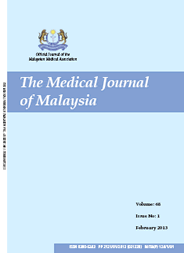MJM, Vol 70 Supplement 1 September 2015
An outbreak of Escherichia Coli at a boarding
school in Samarahan, Sarawak during February 2013
Samarahan District Health Office, Sarawak, Malaysia
ABSTRACT
Introduction: Samarahan District Health Office was notified of a food poisoning outbreak at a boarding school at 12.30pm on 7 February 2013. After verification, an outbreak investigation was carried out to determine the causative agents and the contributing factors so that appropriate control and preventive measures can be implemented.
Methods: A case control study was done and odds ratio (OR) calculated. A case was defined as a person presenting with symptoms of either diarrhoea, abdominal pain, vomiting, or nausea. Cases and controls were interviewed using the standard form (FWBD/KRM/BG/001). Environmental samples taken included tap water, swabs from food handlers and kitchen utensils. The premise was inspected for adequate food storage facilities, appropriate food preparation areas, and sanitation practices.
Results: There were total of 30 cases (attack rate 5.8%) and a majority presented with abdominal pain, headache and diarrhoea. The epidemic curve suggested a common source of infection and the most probable incriminating food was consumed during dinner on 6 February, 2013. Statistical analysis showed that honey dew (OR 34.45, 95%CI 12.86 - 92.32) and chicken “rendang” (OR 7.79, 95%CI 2.95 – 20.63) were the most probable cause of infection. The pipeline to the kitchen was placed in the drain. The water outlet in the kitchen had zero residual chlorine and was positive for Eschericia coli and coliforms. There was no clinical sample tested from the cases as symptoms had subsided during the investigation.
Conclusion: The factors that cause this food poisoning outbreak were water contamination aggravated by improper food preparation and long holding times. Close monitoring by school authority and adherence to food safety are important to prevent similar outbreak in the future.
Keywords: Outbreak, Eschericia Coli, case control study
